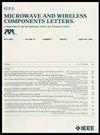A Cryo-CMOS Low-Noise Amplifier With 2.3-to-8.5-K Noise Temperature at 20 K for Highly Integrated Radio-Astronomy Receivers
IF 3.3
2区 工程技术
Q2 ENGINEERING, ELECTRICAL & ELECTRONIC
引用次数: 2
Abstract
This letter presents a 0.9–1.8-GHz cryo-CMOS low-noise amplifier (LNA) built-in standard 65-nm CMOS for highly integrated radio astronomy receivers. The measured cryogenic noise parameters confirm noise matching in the band and demonstrate that the LNA nears its minimum noise temperature at the desired frequency range. The proposed LNA operates at 20 K, consumes 115 mW of power, and provides a 37.2 ± 2.4 dB gain (一个低温cmos低噪声放大器2.3至8.5 K噪声温度在20 K高集成射电天文接收机
这封信介绍了一种0.9–1.8-GHz低温CMOS低噪声放大器(LNA),内置标准65 nm CMOS,用于高度集成的射电天文接收器。测量的低温噪声参数证实了频带中的噪声匹配,并证明LNA在期望的频率范围接近其最小噪声温度。所提出的LNA在20K下工作,消耗115mW的功率,并提供37.2±2.4dB的增益($S_{21}$),噪声温度(图)为2.3至8.5K(0.03至0.13dB),$|S_{11}|<-10$dB。
本文章由计算机程序翻译,如有差异,请以英文原文为准。
求助全文
约1分钟内获得全文
求助全文
来源期刊

IEEE Microwave and Wireless Components Letters
工程技术-工程:电子与电气
自引率
13.30%
发文量
376
审稿时长
3.0 months
期刊介绍:
The IEEE Microwave and Wireless Components Letters (MWCL) publishes four-page papers (3 pages of text + up to 1 page of references) that focus on microwave theory, techniques and applications as they relate to components, devices, circuits, biological effects, and systems involving the generation, modulation, demodulation, control, transmission, and detection of microwave signals. This includes scientific, technical, medical and industrial activities. Microwave theory and techniques relates to electromagnetic waves in the frequency range of a few MHz and a THz; other spectral regions and wave types are included within the scope of the MWCL whenever basic microwave theory and techniques can yield useful results. Generally, this occurs in the theory of wave propagation in structures with dimensions comparable to a wavelength, and in the related techniques for analysis and design.
 求助内容:
求助内容: 应助结果提醒方式:
应助结果提醒方式:


